Democrats Adopt New Rule Requiring Candidates To Actually Be Democrats
Democrats have adopted a new rule requiring future candidates for President to certify that they are Democrats, but it seems largely unenforceable.
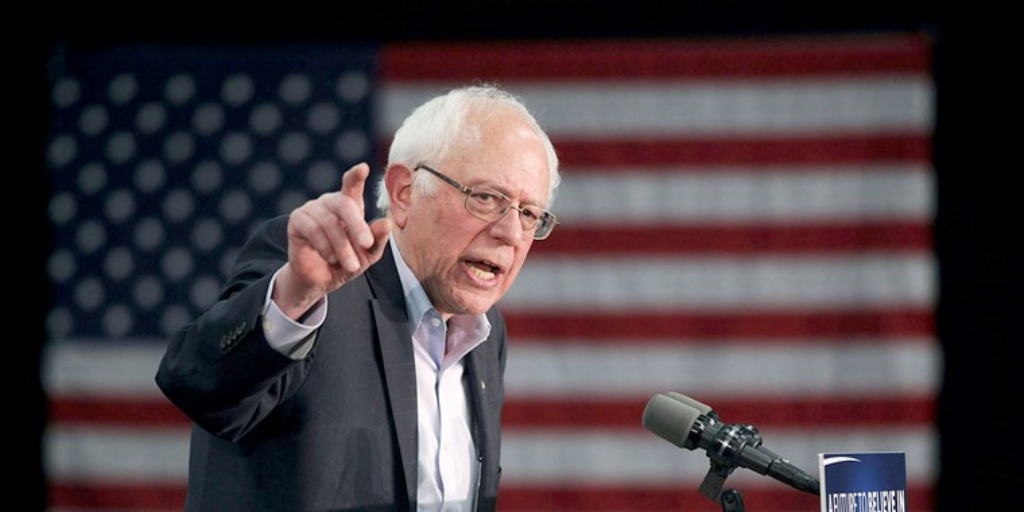
In addition to changes to the rules regarding the role of superdelegates in the nomination process, the Democratic National Committee is also working on other changes to the way the party’s nomination process works, and this one seems to be directly aimed at Vermont Senator Bernie Sanders and his supporters:
Democratic National Committee officials on Friday moved forward with a proposal to force the party’s presidential candidates to identify as Democrats, a move that drew immediate criticism from a top official in Bernie Sanders’ 2016 campaign.
The prospective rule change, approved by the DNC’s Rules and Bylaws Committee, would not necessarily impact Sanders, the independent Vermont senator who ran for president as a Democrat.
Sources familiar with the discussion said officials believed the rule change could help garner support for a separate bid to reduce the influence of superdelegates in the party’s presidential nomination process — a priority of Sanders’ supporters after the 2016 election. Both proposals are scheduled to be considered by the full DNC in August.
Still, Mark Longabaugh, a senior adviser to Sanders’ 2016 presidential campaign, bristled at the DNC committee’s action.
“I really don’t get the motivation for the resolution at all,” he said. “You know, Bernie Sanders got 13 million votes in 2016. Thousands, if not millions, of those votes were young people and independents he brought into the Democratic Party. And I’m just stunned that the Democratic Party’s rules committee would want to try to make the Democratic Party an exclusive club, for which we want to exclude voters and large segments of the American electorate.”
He said, “I just find it a stunning resolution.”
Longabaugh said Sanders would unlikely be affected by the rule change anyway because he could list himself as a Democrat again if he runs in 2020.
According to the draft rule change adopted Friday, “At the time a presidential candidate announces their candidacy publicly, they must publicly affirm that they are a Democrat.”
The draft goes on to require that any candidate pursuing the Democratic Party’s nomination for president confirm in writing to the Democratic National Committee chairman that they are a member of the Democratic Party, will accept the Democratic nomination and will “run and serve as a member of the Democratic Party.”
More from The Hill:
The Democratic National Committee (DNC) adopted a new rule on Friday aimed at keeping outsider candidates like Bernie Sanders from trying to clinch the Democratic presidential nomination in 2020.
The new rule, adopted by the DNC’s Rules and Bylaws Committee, requires all Democratic presidential candidates to be a member of the Democratic Party, Yahoo News reported.
A presidential candidate running for the Democratic nomination must be a member of the party, accept the Democratic nomination and “run and serve” as a member.
Sanders, who has maintained his status as an Independent, fought a tough primary race for the Democratic nomination against eventual Democratic presidential candidate Hillary Clinton in 2016.
A source familiar with the discussions told Yahoo News, however, that the rule wasn’t targeted at Sanders. Randi Weingarten, president of the American Federation of Teachers and DNC member, posted a photo on Twitter Friday of the rules change at the meeting in Providence, R.I.
Here’s Weingarten’s Tweet:
@DNC #RBC just changed the rules to ensure to run for President as a Democrat you need to be A Democrat pic.twitter.com/RyHhV0Exhr
— Randi Weingarten (@rweingarten) June 8, 2018
Based just on basic common sense, it seems axiomatic to me that a political party should be able to insist that a candidate running for their party’s nomination actually be a member of their party. That this would even be controversial at all is, well, strange. Republicans faced a similar issue during the race for the 2016 nomination, of course, when Donald Trump made news by being the only person on the stage for the party’s first debate who would not agree to say that he would support whoever won the nomination. This led to several weeks of controversy, as well as efforts by party leaders in some states to keep Trump off the ballot unless he changed his position. Eventually, the seeming “crisis” was solved when Trump signed an agreement reached with Reince Priebus, then the Chairman of the Republican National Committee, in which he stated that he would support whoever won the nomination. The agreement, of course, was entirely unenforceable and Trump left open the possibility that he would not support the nominee if he failed to win the nomination. Moreover, Trump essentially abandoned the pledge in March 2016, as it became clear that he was going to win the nomination in any case.
During the Democratic nomination fight between Sanders and Hillary Clinton, meanwhile, the issue also came up as many Clinton supporters pointed out that Sanders himself was not even a Democrat even though he caucused with the party in the Senate and has largely voted with the Senate Democratic Caucus. Since there was no rule barring Sanders from running even though he technically wasn’t a Democrat, there was nothing the party could have done. Even if such a rule existed, though, it strikes me that trying to enforce it would have made the fault lines that the Clinton-Sanders fight revealed even worse and made 2016 and the years that have followed even more difficult for the party. If Sanders hadn’t become as popular as he did, perhaps, it would have been easy for the DNC and the state Democratic Party leaders to move against him, but given the fact that his candidacy took off like it did. Once that happened, though, any move to exclude Sanders from running would have been a recipe for disaster and a Democratic civil war that would have torn the party apart.
Even with this rule change, though, it’s unclear what it actually means and whether it could even be enforced. Sanders, or a future candidate like him, could easily join the Democratic Party for the purpose of running for office, and then walk away from the party if they lose, and if they win the nomination then it doesn’t matter what they call themselves since they would effectively be the de facto leader of the party. In that regard, it’s worth noting that this is game that Sanders has played before, and continues to play now. Just a few weeks ago, for example, Sanders announced that he would seek the Democratic nomination for the Senate in Vermont, but that he would not accept that nomination if he won, which he most likely will. Although it is clearly a cynical attempt on Sanders’s part to make sure that there isn’t a Democrat on the ballot to run against him, it’s a tactic that has worked in the past, and there’s next to nothing the party can do to prevent it.
In a similar vein, Jazz Shaw notes that there’s next to nothing the party can do to enforce this rule:
A better question at this point would be to ask how they plan to enforce this rule. Sanders is notorious for insisting that he’s not actually a Democrat, but rather a Democratic Socialist. In 2016 he reluctantly signed on with the Dems but abandoned them as soon as he lost the nomination to Hillary. Let’s just toss reality out the window for a moment and imagine a hypothetical picture of 2020 where Sanders not only runs again but secures the nomination and defeats Trump, becoming America’s first socialist president. Sure, he signed a pledge, but it has no legal weight to it. He could once again quit the party immediately after the election if he so desired.
What would the DNC do at that point, shortly after securing the electoral victory they were so desperate for? Are they going to challenge their own president-elect in court? Will they try to force him out of office? Throw their support to Trump and try to impeach Sanders? Obviously not.
Like I said, this new rule, although perfectly understandable, is largely unenforceable.

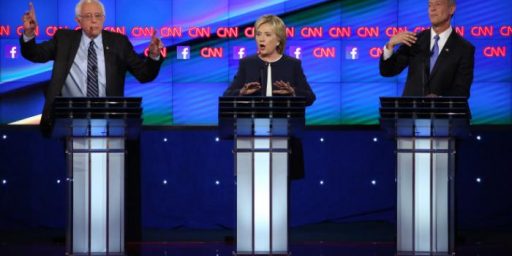
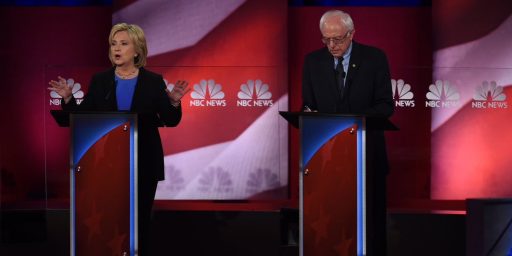
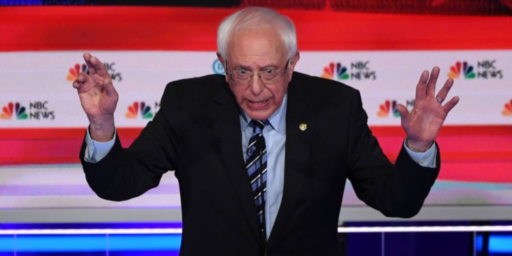
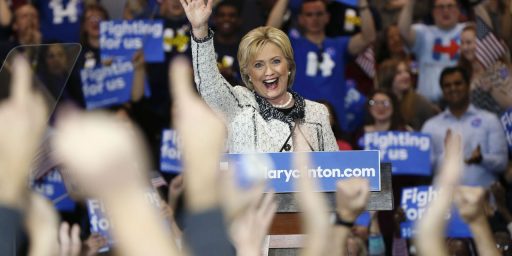
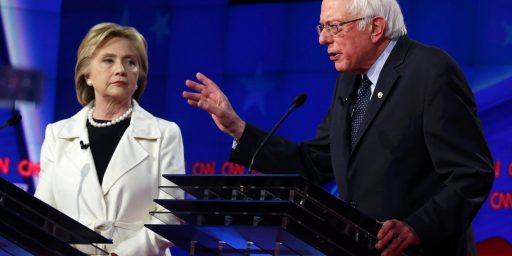
Both parties should set rules that define minimum standards for would-be presidential candidates. Not necessarily as regards party loyalty, but the ability to do the job.
Those rules would be largely unenforceable, and the only qualifications for the job that matter are the ones set forth in Article II of the Constitution.
The rest is up to the voters.
@Doug Mataconis:
I’d say given the lousy job the voters did in 2016, they badly need a gatekeeper for their own good.
Perhaps instead of having an open primary season and then a convention, they could do it the other way around. Have the convention to determine which candidates can run in the party primary, then have the primary season.
Yes, I know this is completely unworkable and impossible. But the nominating system seems broken and it needs to be fixed. So I may as well throw some ideas out and maybe get people to think about it.
That Trump should never have been allowed to run under a party’s aegis is self-evident. But Hillary Clinton shouldn’t have been, either. She was a terrible candidate for a general election. She lost narrowly because Trump was about as bad (as a candidate, not as a person). had she run against Rubio or Kasich, for example, she’d have lost easily.
But one can best illustrate how bad a candidate Clinton was, simply by stating the obvious: she lost against the most unqualified person ever to run for any office.
@Kathy: While she was incredibly flawed as a candidate and was perhaps uniquely disliked by Republicans, Clinton was certainly well-qualified in terms of education and experience for the presidency. Even if we exclude her unofficial experience as First Lady, she spent eight years in the Senate and four as Secretary of State.
@Doug Mataconis: While it’s true that Article II set forth the only Constitutional requirements for the Presidency, the parties could presumably set out others to qualify for their ballot. Moreover, they’re theoretically free to abandon primaries as a binding mechanism altogether. They could either simply go back to having party elites choose the nominee or, perhaps more feasibly, hold a series of primaries that were advisory only to get a sense of how candidates hold up on the stump and how much appeal they have to voters but then select among the candidates based on allegiance to the party platform, character, chances of winning the General, etc. I see no reason to think that’ll happen, though.
This is monumental! This is amazing! The Democrats actually want to make sure that their presidential standard bearer is a…Democrat…such a radical proposal…
Right, that’s simply to run for president…it is a different matter how members of political parties choose to select their nominees…
@James Joyner:
The parties don’t really have much control over this, though. Ballot access is decided at the state level pursuant to the Constitution and, even there, there have been court opinions that have held that the states cannot add ballot access rules for Federal office that purport to add on to the requirements set forth in Article I (for Senators and Congressmen) and Article II and the applicable amendments that have changed it some extent (for President and Vice-President.) I wrote about this in connection with a proposal last year that would require candidates to provide copies of tax returns to get on the ballot in certain states.
And yes, the parties as a whole could decide to abandon primaries and/or caucuses altogether. I doubt they’d do so though because of the blowback that would inevitably follow from a political party essentially depriving voters a voice that they have had for the past fifty years or more.
@An Interested Party:
Yes but as I said in response to James, it’s unlikely that either political party is going to abandon the primary process at this point, never mind return to the “smoke-filled room” method of choosing nominees that existed in the past.
@James Joyner:
That was what got us Benito the Cheeto. During the campaign, several pundits in Mexico tried to assuage fears about Trump, pointing out the candidate with the worse negative ratings usually lost. They may be right. But many Republicans or those leaning republican who thought Trump was a terrible idea, actually disliked Clinton more.
Oh, no question. I judge she had the best qualifications and experience for the presidency since Bush the elder. She just couldn’t get elected. In 2016, she faced a real challenge from an obscure senator. In 2008 she lost a challenge by another obscure senator.
Perhaps the reason such things don’t happen, is that people are so convinced they can’t happen they won’t even try to change them.
@Kathy:
Says who? Based on what criteria would you decide who is “allowed” to run for a party nomination? And why should your criteria be given priority of those other people might have, or those the voters might have?
I’m no Trump fan, but I am not in favor of a system where a bunch of elites get to decide who can or cannot run for political office.
My Democratic Party needs to throw open its doors and say, “Y’all come and together fight for a better future.” If those in current control of the party are going to bend to the Koch brothers and be a mirror immage of their Republican Party liberal-progressives need form a new party out of the Green with a name change to “Y’all-Come Party—of the people, by the people and for the people.
Or maybe The Little Brown Party with us all singing in convention in Nashua Ioway:
There’s a party in the valley on the wild side
No lovelier party raining hail
No party so dear to our livelihood]
As the little Brown Party passing the pail.
(Oh, come, come, come, come)
Come to the party on the wild side
Oh, come to the party raining hail
No party so dear to our livelihood
As the little the Brown Party passing the pail.
And all drink to that
@Doug Mataconis:
Isn’t it bad form to channel the ghost of a still-living person? 😉
Here’s the thing: the two main political parties are not part of the government. They are, as best as I can tell, non-profit, private associations. And yet they enjoy privileges for government functions such as elections, admittedly coupled with attendant electoral regulations.
So on the one hand they keep rivals out and maintain a duopoly. On the other they are powerless to stop anyone from running under their banner. The situation is fair and unfair at the same time, expansive and limited. It’s ludicrous.
@Doug Mataconis:
Elites? Awesome. Nice cheap shot.
Who is arguing that Elites are going to decide who can or cannot run for political office. Nice strawman. We’re discussing how PARTIES choose to have Candidates represent their PARTY.
Would Donald J. Trump have won had he been an “independent”? No.
Can the GOP choose who represents them as the GOP Nomination? Yes.
Should Dems be able to decide who is a Democrat? Yes.
Anyone can run for office. Parties should have the right to who represents the party.
@Kathy:
No, the reason it won’t happen is the same reason why the idea of repealing the 17th Amendment, which allows for the election of Senators rather than their appointment by state legislatures as originally called for under the Constitution, will never be repealed even though there might be good arguments in favor of it.
Because the American people would not stand for something that they would clearly perceive to be anti-democratic (in the small “d” sense rather than referring to the political party) and which would take away the ability of voters to determine the nominees of their respective parties and put it in the hands of elites.
@EddieInCA:
Who, exactly makes up the “party”? Who would get to decide who does and doesn’t get to decide who runs under the party banner for a given office?
And, yes, I think “elites” is the proper term to use here since the suggestion being made is to take the decision away from voters and place it in the hands of people who supposedly know better who the nominee should be.
In any case, the odds that either majority party would be able to eliminate primaries as some seem to be suggesting are somewhere close to zero. The voter rebellion from the base in either party would be too massive for party leadership to withstand.
@Doug Mataconis:
Um… The people who administrate the party. Each party has a specific structure, which allows it to raise money, craft and hone a message, endorse candidates, etc. But you know all this. You’re just doing your normal libertarian trolling, which is awesome in the abstract, yet completely silly when looking at how the real world works.
In your world, David Duke could run as a Democrat and the National, State, or Local Democratic Party could do nothing about it. That’s absurd on it’s face. Same as Jessie Jackson running as a Republican. Not. Gonna. Happen. Parties wouldn’t allow it. Nor should they.
@Doug Mataconis:
Years ago while I was in graduate school, one of my professors had just returned from a sabbatical as a Fulbright Scholar to Nicaragua. He related a story of a conversation with a taxi driver who asked what real advantage Democracy provides. Among other advantages, my professor offered that Democracy offers free and unhindered elections, about which the driver called bullshirt, noting that, in his perception, the only difference between elections in Nicaragua and the US was that while Nicaragua rigged the elections at ballot box, the US rigged its elections at the nominating system. When my professor objected, the taxi driver challenged him:
The “elites” have always chosen who will run and continue to do so. They spent a generation preparing the field for the array of demagogues they presented on the GOP side [it takes a looooong time to create true dittoheads] and the anointed feminist symbol on the other. It is only now that they’ve discovered that the creation is a “monster.” Their only regret is that they got caught in their hubris.
@Kathy:
Trump is a great example of someone picked by the voters who was a disaster. On the other hand, people picked by a committee of powerful people is going to make some pretty bad choices too (Andrew Jackson comes to my mind, given that I think he’s far worse than Trump (at least worse than anything Trump has done yet, though of course Trump still has two years to set his own trail of tears in motion) and he was okayed by the party before going to the voters). There may not be any fail safe method. Voters can F-up badly. Committees can F-up badly.
Basically, if the country is in a state where people like Jackson and Trump can get elected, there’s probably no formal procedure that is going to stop it. The USSR for instance had one of the greatest constitutions in history – which had nothing to do with how it was actually run.
@EddieInCA:
In other words, the elites.
This is not trolling. This is me pointing out that you are proposing taking the candidate selection process out of the hands of voters and putting it (back) in the hands of party leaders largely made up of current and former elected officials and the leaders of other groups that control powerful constituencies within the respective parties. There’s nothing wrong with this position, but surely you must realize how anti-democratic this is, and how unlikely it is that any major party would be able get away with returning to this system.
This, after all, is what the protests at the 1968 Democratic National Convention were arguably all about. Under the system that existed at the time, even if Bobby Kennedy had lived it’s highly likely that Hubert Humphrey still would have been the party’s nominee that year due to the fact that he had the support of all the party insiders.
He could run, but there’s no way he’d win a Democratic primary. Just as there’s no way Jesse Jackson would win a Republican Primary.
Again, as I said, I’m not saying the system you propose is wrong. I am saying it won’t be adopted (or returned to) because the base of either party would not stand for it.
@Doug Mataconis: Doug, the DNC may not be able to stop a candidate from qualifying at the state level for a (state-ran) primary, but it doesn’t have to allow those delegates, which the candidate would otherwise receive, to participate in the convention which actually nominates the candidate.
I seem to recall that in 2008, the DNC was considering throwing out Michigan’s delegates en masse because the state party violated a rule about the scheduling of the primary.
@Timothy Watson:
Perhaps true, but it would be next to impossible for the party to do that for every delegate for a candidate the party elites don’t like. Especially if that candidate, like Trump, came into the convention with the most delegates.
Perhaps they could do it under the relevant rules, but it would rip that party in two.
As a general observation, I will just say that it seems to me like several of the commenters are looking for some way to adopt a rule that would bar another Trump from running for a party nomination, or from winning it if they do run.
Under our current system, the only way to do that is to defeat that person in the primaries. You can propose eliminating primaries if you wish but my point is that it’s not likely to happen because the people that make up the party, the voters, wouldn’t stand for it.
@george:
I wouldn’t keep the voters out entirely.
In Mexico it varies by party how candidates are chosen. There are no primaries, but some parties allow “militants” to vote. These people are dues-paying members of a party, who are involved with its workings in some way. Others just appoint a candidate by consensus from the leadership, or because that guy founded the party, etc. it gets complicated when two or more parties join in an alliance.
No way Americans would stand for something like this, I know.
Mexico has less to lose from a terrible candidate winning the election, though. For one thing, the country has stabilized into a three-party system (though the parties vary), and thus far not one has gained control of Congress. That helps keep excesses in check.
@Kathy:..I’d say given the lousy job the voters did in 2016, they badly need a gatekeeper for their own good.
They’ve got one. It’s called The Electoral College.
@EddieInCA:
He already did that.
(So did Robert Byrd btw.)
@Kathy: I wouldn’t keep the voters out entirely.
I am so relieved. For a minute I thought you agreed with Col. Mason of Virginia* at the Federal Convention of 1787 as recorded in Madison’s Notes.
*At Philadelphia in 1787 Mason was one of the five most frequent speakers at the Constitutional Convention. He exerted great influence, but during the last two weeks of the convention he decided not to sign the document.
I think it’s pretty obvious that Kathy wants to be ruled by Our Betters, the Elites if you will.
She has demonstrated that she has ZERO respect for the voters of this country, truly believing they are indeed deplorable and are in need of a more Cultured, Educated Class to run their lives and tell them what is best for them.
She has evidently spent her entire political life advocating for a more powerful government, run by elites, where the regular people have next to no say in what the government does.
She likes centralized power in the hands of the Executive.
She wants a dictatorship.
She just doesn’t like the person currently holding onto the very powers for which she has fought.
Also, I hope Bernie runs as in independent.
Oh, and one last thing…..MAGA, everyone!
@Doug Mataconis: It’s ok to strip away liberties so long as your own guy benefits.
@Kathy:
Oh thank you SO much, Your Worshipfulness, for allowing us at least the semblance of a choice! So kind of you!
Kind of like how Saddam Hussein held elections, you would offer the great unwashed masses a chance to let them know just how much they love and adore you.
Jack Johnson vs John Jackson.
You won’t keep the voters out entirely. You just won’t let them have any meaningful input into how they are ruled.
You are a piece of work.
@Kathy:
But their system would fall apart too in the right (or wrong) hands. Playing very loosely with the vague terms ‘good’ and ‘bad’, you really need both a good public and a good elite to get good results from any system, because systems can easily be distorted (or re-interpreted) by bad people.
Its not the formal process that led to Trump, its the circumstances (meaning an awful lot of very complex history going back decades). If the GOP still had the old smoke filled rooms deciding upon their nominee Trump would not have gotten the nomination and there’d be some other president now (possibly Bush the 3rd). That’s good, Trump was by far the worst of the GOP candidates. But there would be different problems, which is why those smoke filled rooms are no longer accepted; the old system didn’t work either.
@george:
Remember Kathy’s First Law: There are downsides to everything.
The problem in 2016 is not that the GOP nominated the worst possible candidate. The problem is that in the year the GOP did that, the Democrats also nominated a terrible candidate (from an electoral perspective). So both party systems failed.
I don’t have a better alternative offhand, but we should look into the matter and think about it. A lot of pixels have been spilled to the effect that the most radical elements, the base, of both parties dominate the nomination process as it exists. That’s bad regardless of your political preferences.
How does one change that? No doubt there are several options and no magic bullets. From changes to the nomination process, to finding means for making primary voting easier. Perhaps getting the various states not to get involved in the primaries at all?
There are downsides to all choices. The downside to the choices made in 2016 is busy wrecking the last 7 decades worth of global progress.
@Mister Bluster:
So, who died and made me so powerful? 😛
@Kathy:
The United States has the weakest parties among Democracies, it’s one of the most singular characteristic of the American political system. In many countries party leaders, even people that does not hold public office, are extremely powerful. In the United States they are basically people that raise money and organize conventions.
To me the real problem is that a system with pretty weak parties can’t work with unlimited campaign money. You lose control about everything.
@Andre Kenji de Sousa:
That’s part of the paradox I mentioned earlier: The 2 major parties are weak. The 2 major parties keep all other parties off the scene.
Funny how he praises the current Republican president, but I suppose that racists of a feather do flock together…
Well, judging by your comments, most people (whether they are elites or otherwise) are better than you…
@Doug Mataconis:
Obviously, I”m not being clear. I’m not proposing anyone choose who gets to run. I’m proposing that those who want to run UNDER THE BANNER OF A SPECIFIC ORGANIZATION should be part of that organization. Should I be able to run under the official banner of the Republican party if i”m registered as a member of the American Socialist Party or Green Party. If your answer is yes, that defies logic. Let me be clear. I”m proposing that anyone can run for an office. Anyone. But not anyone can be labeled a “Democrat” or “Republican” unless they’re a member of that party. Run as an Independent. Run as Non-Affiliate.
And I actually laugh at your definition of “elite”. So the 55 year old woman in Newnan, Georgia, who decides to become a member of the local GOP or Democratic Party as a way of getting involved in her locality, is now suddenly an “elite” because she’s a member of the party? That, too, defies logic.
You people have to figure out what your definition of “elite” is, because it seems to actually mean “Anyone who I don’t agree with.”
I notice the picture of Bernie Sanders along with this post, and it wouldn’t really be a stretch to call this the “Bernie Sanders rule”. The ironic thing though, is if the Democrats hadn’t been so effective in 2014/2015 at clearing the field of other “A list” candidates who might challenge Hillary Clinton, the Bernie “revolution” almost certainly wouldn’t have happened.
Also, why oh why is the DNC making these type of rules and changes NOW, right before an important mid-term where unity on the left will be a key to victory? …. the petulant little children of the left are just looking for another reason to revolt. They can’t stand Donald Trump, but many of them hate the DNC nearly as much.
@Andre Kenji de Sousa:
There you’re on to something. The funders used to be more integrated into the party. The hidden primary among the fundraisers used to exercise something of a gatekeeper function. Now it seems anyone can find a billionaire to stake him. Trump claimed to be self-funding, but, unsurprisingly, he lied. Money is the root of all evil, including being the root cause of the lack of party control.
The parties have lost control, Doug hates campaign finance limits, maybe we could re-institute the 95% marginal income tax rate as a way to cut down on the influence of money. For economic reasons, Piketty proposes a wealth tax. Might also be a good idea as political finance reform.
@EddieInCA:
How does that work exactly? Do you have to be a “card carrying” member of the GOP or Democratic Party to be allowed to run? Who would determine whether a candidate for office is a “real” Republican or Democrat and what criteria would they use?
In some states, I will grant you, one can register to vote as either a Republican or a Democrat and generally speaking one can only vote in a party primary if you are a registered member of that party (although some states allow people who are not specifically registered to vote in either party primary provided that they only vote in one primary.) In many states, though, there is no party registration via the state, and indeed I would argue that it should be seen as unconstitutional for a state (as opposed to a private political party) to require that someone be a registered as a member of a political party in order to vote. This is the case here in Virginia, for example.
Again, as I’ve said above, political parties are free to choose their nominees however they see fit and, in many cases they do not use primaries for offices below President or for nominations for Special Elections for the House of Representatives or Senate. My argument is that, especially at the Presidential level taking that power away from voters and returning to the proverbial smoke-filled room would likely prove to be impossible mostly because voters would not stand for it.
And, interestingly, if Democrats had decided to skip primaries in 2016 then Clinton would have easily won the nomination since she had the backing of pretty much every high-ranking Democrat in the country.